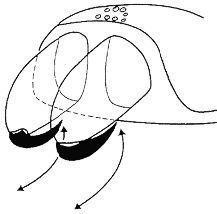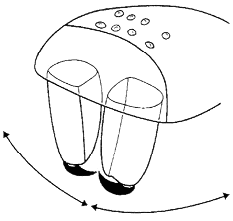|
Araneae (spiders)
Life
> Eukaryotes
>
Opisthokonta >
Metazoa
(animals) > Bilateria > Ecdysozoa > Panarthropoda > Tritocerebra >
Arthropoda > Arachnomorpha > Cheliceriformes > Chelicerata > Euchelicerata
> Arachnida
Many different spider species occur in your garden
and home. Only a couple are venomous and pose a possible threat to man.
We acquaint you here with the more common spiders in southern Africa for
which the Iziko South African Museum is regularly approached for
identification. Spiders perform a vital function by keeping down the
populations of various insect pests and should be encouraged in your
garden and around the home, instead of emptying cans of insecticide on
every one that is seen.
|
On this page:
See also:
"If you wish to live and thrive, let the spider
run alive"
|
Ask
Norman
Norman Larsen answers your questions on spiders in the Western Cape of South Africa.

These pages on spiders were written by Norman Larsen and Margie Cochrane,
with photographs by Norman Larsen

|
|
Suborder Mygalomorpha (Primitive, 2 pairs of
booklungs, chelicerae/fang action
paraxial - forward and downwards). |
Suborder
Araneomorpha
(1 Pair of booklungs, majority of species are web makers.chelicerae/fang action diaxial - sideways and inwards (pinching).
|
|

|

|
|
|
|
Links
- BRISTOWE, A. M. 1958. The World of Spiders. London:
Collins. 304 pp.
- BURNET, B. 1994. The Silken Web. A Natural History of
Australian Spiders. Sydney: Reed New Holland Books.
- BURNET, B. 1998. Spiderwatch. A guide to Australian
Spiders. Sydney: Reed New Holland Books.
- DIPPENAAR, A. and N. 1987. Spiders. The Insight Series.
Pretoria: De Jager-Haum.
- DIPPENAAR-SCHOEMAN, A. 2000. Field Guide to South
African Spiders. Pretoria: Briza.
- DIPPENAAR-SCHOEMAN, A. S. and JOCQUÉ,
R.1997. African Spiders. An Identification Manual. Plant Protection Research
Institute, Handbook No.9. 392 pp.
- DIPPENAAR-SCHOEMAN, A. S. and MÜLLER, G. 2000. Medically
important spiders and scorpions of southern Africa. (CD-Rom). Pretoria:
Agricultural Research Council. (See details under Spider
bites).
- FILMER, M. 1999. Southern African Spiders. An Identification Guide.
Cape Town: Struik. 112 pp.
- FILMER, M. AND LARSEN, N. 2010. Filmer's spiders - an identification
guide for southern Africa. Struik Nature, Cape Town.
- FOELIX, R. F. 1982. Biology of Spiders. Cambridge, Massachusetts:
Harvard University Press. 306 pp.
- HAWTHORN, T. 1998. Spiders and Scorpions of southern Africa. A First Field
Guide. Cape Town: Struik.
- HILLYARD, P. 1994. The Book of the Spider. From Arachnophobia to the Love
of Spiders. London: Hutchinson.
- HILLYARD, P. 1997. Spiders. Glascow: Harper Collins.
- JONES, D. 1983. Spiders of Britain and northern Europe. Middlesex:
Country Life Books.
- KASTON, B. J. 1972. How to know spiders. 3rd ed. Dubuque: W. M. C
Brown Publishers. 272 pp.
- LAWRENCE, R. F. A Conspectus of South African Spiders. Department of
Agricultural Technical Services, South Africa Science Bulletin 369. 64 pp.
- LEROY, A. and LEROY, J. 2000. Spiderwatch in southern Africa.
Cape Town: Struik. 96 pp.
- LEVI, H. W. and L. R. 1968. A Guide to Spiders and their kin. New
York: Golder Press.
- MARSHALL, S. D. 1996. Tarantulas and other arachnids. A complete guide.
New York: Barrons.
- MASCORD, R. 1991. Australian Spiders in Colour. Sydney: Reed Books.
- NEWLANDS, G. and De Meillon, E. 1986. Spiders. Struik pocket guides
to southern Africa. Cape Town: Struik. 64 pp.
- PRESTON-MAFHAM, R. and K. 1984. Spiders of the World. Dorset: Brandford
Press.
- PRINS, A. J. AND LEROUX, V. 1986. South African Spiders and Scorpions.
Cape Town: Anubis Press. 72 pp.
- ROBERTS, M. J. 1995. Collins Field Guide to Spiders of Britain and
northern Europe. London: Harper Collins.
- SMITH, A. M. 1990. A revision of the Theraphosidae family from Africa and
the Middle East. London: Fitzgerald Publishing.142 pp.
- TAYLOR, B. 1999. Spiders. Nature Watch. London: Lorenz Books, Anness
Publishing.
- YATES, J. H. 1968. Spiders of southern Africa. Cape Town: Books of
Africa. 200 pp.
|
